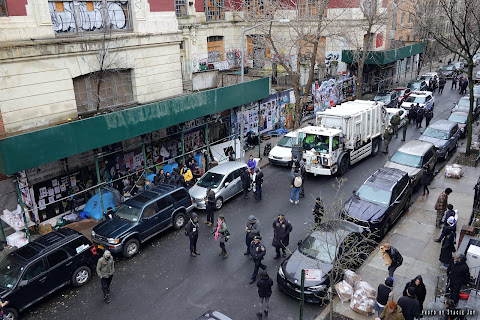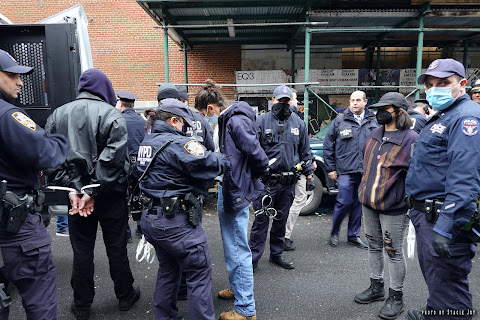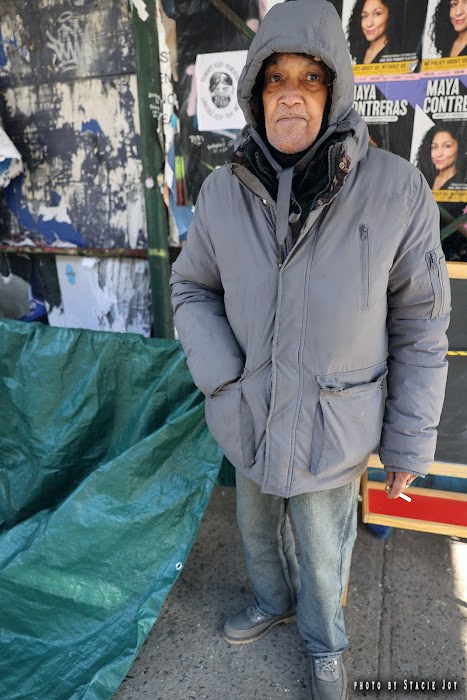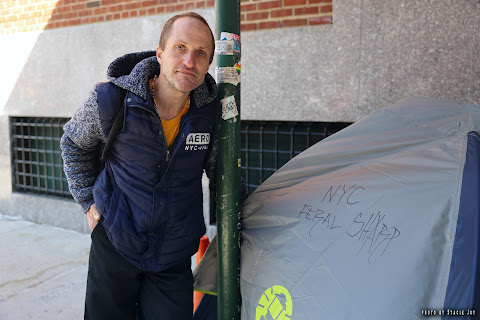Photos by Stacie Joy (click on images for a larger view)
On Friday afternoon, a Department of Homeless Services-led entourage, featuring the Department of Sanitation, the Parks Enforcement Patrol and the NYPD, conducted a "clean-up" in and along Tompkins Square Park.
Several posted notices, dated in late October and early November, detailed what would be taking place, a process that most of the residents — a number ranging from 10 to 25 at any given time — have experienced while sheltering along Seventh Street between Avenue A and Avenue B late this summer and early fall.
The flyers also offer information about DHS shelter services and how to apply online for various grants...
EVG contributor Stacie Joy was there to document the proceedings. There were two sweeps — one on Seventh Street where nearly a dozen makeshift tent encampments have arrived since the late summer ... and the other inside the Park,
where the people who had been congregating at the now-closed chess tables have moved.
The people staying on Seventh Street did everything themselves with trash bags and other items provided by the city: They cleaned up their areas, threw out some garbage, struck their tents and waited it out across the street... all under the supervision of the various city agencies...
The clean-up went on mostly without incident. One man, clearly agitated, hurled insults at the Parks Enforcement Patrol and NYPD while filming them. They did not respond to his tirade, and he eventually stopped.
Stacie spoke with several of the people who have been living along Seventh Street. (She also had their permission to take photos.)
They reported the same problems that we've heard countless times: the shelters aren't safe, they can't be with their partners and their personal belongings get stolen or destroyed.
The people Stacie talked with said they continue to feel safer on the street than inside a city-run shelter.
According to an April
report by Coalition for the Homeless titled "View From The Street:"
"Shelters are considered by many homeless individuals as providing an unacceptably low level of personal security. The incidence of theft, physical attack, or other types of violations in the shelters — whether experienced, witnessed, or simply rumored — clearly contributes to the perception of the shelter system as chaotic and unsafe."
This article at The City documents why some people would rather stay on the streets.
Several of the residents living on Seventh Street are also experiencing substance-dependency issues. (NARCAN kits were spotted in some of the tents.)
On Seventh Street Friday afternoon, Junior was protecting his friend JD's tent and belongings. JD has a 9 to 5 job in New Jersey and wasn't there for the sweep. Junior carefully cleaned everything up, sat with it all, and set it back up when the enforcement team left.
There's Jonny and Slay, a queer couple who are fiercely protective of one another.
Benny, a leader of sorts along here, issued directions for the others. He's been through this many times before and seemed resigned to the situation. He gave guidance for the others about what can, might and should happen. He was essentially correct.
Sapphire, the only woman on the block, asked for help finding feminine hygiene products.
Meanwhile, the sanitation and parks crews were much less discriminating inside the Park, tossing everything they saw along the benches on the southern section ...
This is also where residents witness more frequent open-air drug use (heroin and K2) and dealing.
Back on Seventh Street, the tents returned to their previous locations by nightfall, with the residents wondering when the next sweep might occur.
"Most asked me why they have to play a game like this. The Parks Department sergeant says they have to move their stuff or it will get tossed. The 9th Precinct says the residents can't obstruct access on the sidewalk and their belongings must remain attended to," said Stacie. "So they ended up striking their homes, temporarily moving across the street, and then coming back a few hours later and setting up in the same spots."
As housing advocates told the Times over the summer, these citywide sweeps just move people from one place to another and fail to address the housing crisis and provide stability, recovery and treatment to those who need it.





















































